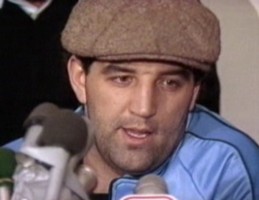 By James Slater: Gerry Cooney, a genuine boxing superstar in the 1980s, scored the final win of his career twenty five years ago next month (a 1st-round KO over Eddie Gregg in May of ’86) and despite his physical attributes and massive promise, Gerry acknowledges his career never turned out as great as he and many others had hoped. Why? In the opinion of the immensely likeable Cooney, who I had the pleasure of speaking with recently, it was overwhelmingly down to the enforced inactivity he suffered
By James Slater: Gerry Cooney, a genuine boxing superstar in the 1980s, scored the final win of his career twenty five years ago next month (a 1st-round KO over Eddie Gregg in May of ’86) and despite his physical attributes and massive promise, Gerry acknowledges his career never turned out as great as he and many others had hoped. Why? In the opinion of the immensely likeable Cooney, who I had the pleasure of speaking with recently, it was overwhelmingly down to the enforced inactivity he suffered
Cooney, unwilling to sign with promoter Don King, was simply unable to get enough fights, and this made his realizing his full potential impossible. When looking back today, the one experience, the one regret Cooney has, is his time out of action. Had it not been for lack of experience inside the ropes, Gerry – now aged 54 and as happy as can be with his life – is sure he would have become world champion.
Here he speaks in detail about the key experiences of his life, the ones that made him the fighter he became..
James Slater: It’s a pleasure to be able to speak with you, Gerry. What would you say were the key things that shaped you as a fighter?
Gerry Cooney: My upbringing really shaped me as a person. My father was an Irish catholic and he ran the house with an iron hand. He used to drink a lot, too. There was a lot of negativity in my house as I was growing up. Boxing was my chance – I realize now, looking back – to release the anger I had. I was always trying to prove my father wrong, when he told me I wouldn’t do something; when I wouldn’t win a certain fight. I also loved the idea of how boxing made me a somebody. I wanted to see how far I could go. My tough childhood years made me into a fighter. I wanted to do it, though. My older brother, Tom, he left home at fifteen and he began boxing at 19. I trained with him. He was a big influence on me.
J.S: You were a huge star at your peak; how did that affect you – the pressure to become great?
G.C: The Great White Hope” tag never bothered me. That was all bullshit! I never paid attention to any of that. That never added any pressure. That was just Don King’s doing, and his attempts to make more money. But King did affect me as a fighter, because I couldn’t get any fights because I wouldn’t sign up with him. The lack of experience in not being able to get more fights and not being able to grow and develop, that really was a big deal to me. That is definitely the biggest and most important thing I would say on the subject of what shaped me as a fighter – the lack of experience due to not having enough fights. When I KO’d Ken Norton, that was a big deal, but I wasn’t able to get another fight before going into the biggest fight of my life against Larry Holmes. Consequently, I had it in my head going in to the Holmes fight that I couldn’t go the distance, that my stamina might be lacking. I wanted to go the distance to prove wrong the people who said I couldn’t do it.
J.S: Who were the “good” people you worked with in your career?
G.C: One of the best people I worked with who helped me and made me the fighter I was, was my trainer Victor Valle. A great person, he was a great trainer. But because I never had the number of fights I needed, I never actually learnt how to fight properly until after my career was done, or almost done. When I was young, it was like ‘go get ’em, go get ’em.’ Later, at the end, when it was too late for me, I learnt how to play a guy, how to set him up, how to take my time. But when I was young, I never had that chance. And it affected me that the public didn’t understand why I wasn’t fighting enough. That frustrated me.
J.S: Which early fights helped to shape you into a contender?
G.C: Some of my early fights did help shape me into the fighter I became; even though I never fully developed as I should have done due to not fighting enough – I fought just three times from December of 1979 to the fight with Holmes in 1982! I beat a guy called Animal Lopez, and I beat him quite easily by wide decision. That experience was great for me. And my quick stoppage wins over Dino Dennis and Norton; they helped me a whole lot.
Cooney retired in 1990 with a fine 28-3(24) record.